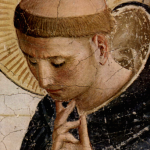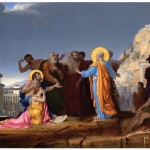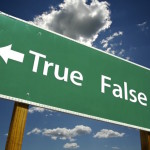The Splendor of Thomistic Theism
by Karlo Broussard
Filed under The Existence of God
NOTE: This is the second of a two-part series. Read part 1 here.
With the accidentality and priority of being for sensible things now in place, there is only one preliminary metaphysical principle that we need to establish before we can defend Premise 1 (from the first part in this series) and that is the fact that every particular thing—whether sensible or non-sensible (immaterial)—whose being is accidental and prior to its nature must receive being from an agent outside itself, i.e., an efficient cause.
First, whatever is accidental does not exist in its own right but is dependent upon a substance. (Remember the redness of the triangle mentioned earlier.)
Second, since being is an accident in the “wide sense” of the term for such things under consideration, it must be dependent upon a substance.
Third, it can’t be dependent upon the substance (think “house”) that it actuates due to its priority. If being was dependent upon the substance that it actuates, then the substance would be prior to its act of being. But if the substance (“house”) was prior to its act of being then it would be nothing since it would not have its act of being. In other words, the house would not exist. But the house does exist. Therefore, the act of being of something for which being is accidental cannot depend on the substance its actualizing.
Therefore, the act of being for a thing whose being is accidental and prior to its nature must be dependent upon some substance other than the substance that it makes actual—i.e., the thing cannot give itself being but must receive being from something else.
Now, to give being to something is to cause it through efficient causality. Therefore, anything whose being is other than its nature must receive its being by an efficient cause other than itself.
Can All of Reality Consists Only of those Things Whose Being is Accidental and Prior to its Nature?
With all our preliminary metaphysical principles established, we can now move to defending Premise 1. The basic question is, “Can all of reality consist only of things whose being is accidental and prior to its nature—things that can only receive being from an efficient cause outside themselves?”
To begin answering this question, consider the hypothetical scenario if all of reality consisted only of things whose being was accidental and prior to its nature—things whose act of existence did not belong to their nature.
If this was the case, then every particular thing that makes up “reality” would be a nature that was existentially neutral—a thing that is merely open to receiving being. In this scenario reality would consist only of natures—whether a finite or infinite amount (the quantity does not matter)—that contained no being.
This would be analogous to a series of interlinked train cars that has no engine car. No matter how many cars one posits in the series, no train car would ever have motion.
Similarly, if every particular thing within “reality” was something whose being was accidental and prior to its nature—something whose act of being did not belong to its nature—then reality would only consist of what philosophers call “existential zeroes”—natures with no being. But if reality only consisted of natures that contain no being, then no particular thing would exist; and if no particular thing would exist in all of reality, then nothing would exist; hence Premise 1. In other words, in this hypothetical scenario being would never get into the system of reality.
The Rest of the Story
But the fact that I’m writing and you are reading this article indicates that being (existence) has entered the system.
Therefore, all of reality cannot consist only of those things whose being is accidental and prior to its nature; hence the conclusion.
Another way to state the conclusion is that there must be some entity whose being is not accidental and prior to its nature but coincident with and essential to it. In other words, for such an entity its being would be its nature—it would not possess being but would be being itself—its nature would be “to be.” This reality is what Scholastic philosophers call “subsistent being,” which simply denotes that the substance (a word that is closely related etymologically with “subsistent”) one arrives at through philosophical reasoning is being itself.
Is “Subsistent Being” God?
With the existence of “subsistent being” established, the next question is, “What can we know about such a being? Is such a being worthy of the term God?”
First of all, we can say that “subsistent being” would have to be the efficient cause responsible for being entering into the system of reality to begin with. Recall that in the scenario without subsistent being, being could not enter into the system. But being did enter into the system.
So, either being came from sheer nothingness or from subsistent being itself. If being came from sheer nothingness then there would be no reason why there is being rather than non-being. But to say that there is no reason for being rather than non-being is the same as saying there is nothing to distinguish being from non-being, in which case being and non-being would be one and the same which is absurd. Therefore, being cannot come from sheer nothingness. Therefore, the fact that there is something rather than nothing must be due to subsistent being itself—it’s the efficient cause of being.
Now, subsistent being is not merely the efficient cause of being entering into the system at some point in the past, but it must be the continuous cause of being for things here and now. Consider the fact that natures (essences) are conjoined to the act of being (existence) right here and right now. This is either due to themselves, some other nature for which being is accidental and prior, or subsistent being. Obviously we can’t appeal to a thing’s own nature to explain its continued existence when we can’t even appeal to it to explain it coming into existence in the first place (see the third preliminary metaphysical principle above). Furthermore, we definitely can’t appeal to some other nature of the same type less we end up with the same problem. Therefore, the continued existence of any particular thing whose being is accidental and prior to its nature must be due to subsistent being; thus subsistent being is the continuous source of being for all else that is besides itself.
Moreover, because subsistent being has existence coincident with its nature and does not have it accidentally but essentially (by nature) it does not depend on any efficient cause outside itself; hence it is an uncaused cause.
From this it follows that subsistent being is first in the order of efficient causality—“first” in the sense of ontological priority (“most fundamental”) and not necessarily temporal priority. As the first efficient cause of being, it is totally outside the series of causality among things for which being is accidental and prior to their nature.
Now, if subsistent being cannot be caused, then it must be pure actuality—void of all potentiality—since all things that are caused involves the actualization of some potency. This further means that subsistent being cannot receive any further perfection to its being otherwise it would be in potency to that perfection; thus it must be perfection in the highest degree.
Again, if subsistent being is pure act void of any potency, then it necessarily follows that subsistent being is incorporeal (immaterial) since everything of a corporeal nature (matter) contains potentiality—subject to taking on different forms.
Subsistent being, or pure act void of potency, is also entirely immutable (changeless) since mutability entails the movement from potency to act.
Eternality follows directly from immutability since all temporal beings are subject to change.
The pure actuality of the subsistent being further leads one to reason that subsistent being is completely unlimited, i.e., infinite—it can’t be restricted to existing in this way instead of that way for if it was it would be in potency to the other modes of being, which is absurd.
It must also be absolutely simple—void of any composition (e.g., form-matter and/or essence-existence) since the unity of nature and being is the very understanding of “subsistent being.” One can also reason that composite parts are in potency with respect to the whole, which of course cannot be so with the pure actuality of subsistent being.
Finally, the question becomes, “Can there be more than one of these things?” This brings us to the final attribute for this article, namely unicity. If there were a multiplicity of subsistent beings (pure acts of existence), then there necessarily would have to be a differentiating factor in at least one of them. But if one of them had a factor that differentiates its act of existence from the other act of existence, then that factor would be distinct from its act of existence, in which case it would not be absolutely simple, which is incoherent for subsistent being.
Conclusion
So, in conclusion, while I have a tremendous respect for the great theistic apologist of modernity and the arguments they employ, I must say that I find myself enamored by the breadth and depth of the Thomistic framework for natural theology. Where the rope ends for many popular theistic arguments in modern thought, such as a Creator that is very powerful but not pure power itself, beyond our time but not atemporal, one being among many but not pure being itself, it continues for the subsistent being arrived at in the Thomistic framework of thought.
So, unbelievers need not wander in the darkness of unbelief any longer. The light of the Angelic Doctor that shines in this proof and others like it has the power, I believe, to illumine the path to the God whom Thomistic philosophers know as ipsum esse subsistens and whom theologians know as “I Am Who Am.”
Related Posts
Note: Our goal is to cultivate serious and respectful dialogue. While it's OK to disagree—even encouraged!—any snarky, offensive, or off-topic comments will be deleted. Before commenting please read the Commenting Rules and Tips. If you're having trouble commenting, read the Commenting Instructions.













